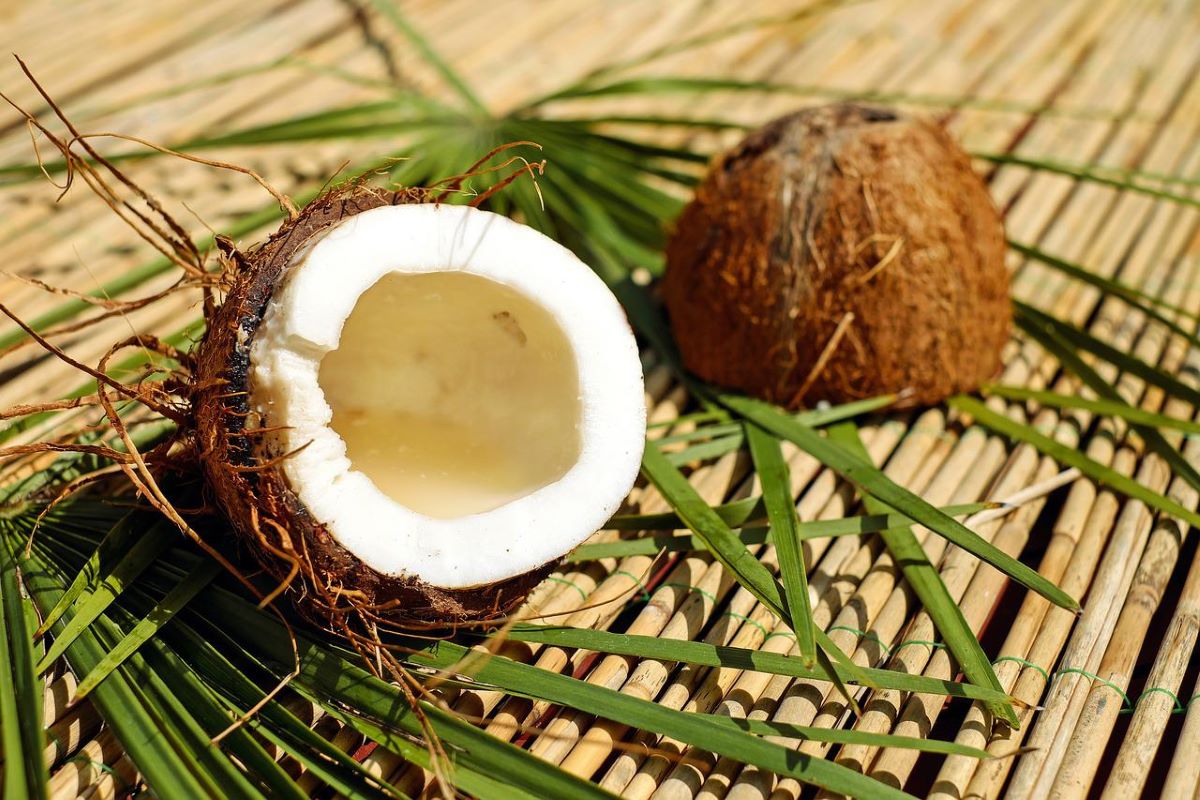Coconut is a versatile fruit that has many uses. In some parts of the world, coconut is considered a staple food. But many people do not know how to tell if a coconut is bad or that it goes bad at all. Coconut typically reaches maturity at 3 to 5 years, but can be matured in 2 years in tropical regions.
But how to tell if a coconut is bad? There are a few ways to tell if a coconut is bad.
Smell it. If it smells like the inside of a shoe, or if it has a sour odor, it’s probably spoiled. Look at it. If the coconut looks wrinkled or cracked, then you shouldn’t eat it. Touch it. A soft-rind coconut is probably still good, but if your finger sinks into the shell and leaves an indentation, then throw that baby out! If you’re still unsure err on the side of caution and discard the coconut.
How Long Do Coconuts Last?
Coconut, a popular fruit in many countries, can last up to two years if it is stored properly. To keep your coconut fresh and edible for the longest time possible, store it at room temperature and away from direct sunlight. If you live in a warm climate or have limited space in your refrigerator, it is best to keep your coconut outside of the refrigerator. This is also why you should know how to tell if a coconut is bad.
If you are storing your coconut in a cool place like a refrigerator or freezer, wrap it tightly in plastic wrap and then put it in an airtight container or bag. This will help prevent moisture from getting into the coconut shell and rotting the meat inside. Once you have opened your coconut, make sure that you use its contents within one week for maximum freshness and flavor.
What Is The Best Way To Store Coconuts?
If you’re looking for the best way to store coconuts, it’s important to consider a few factors. The first thing you need to know is that coconuts are sensitive to heat and light, so keep them in a cool, dark place. A basement or pantry works well for this. If you have room in your refrigerator, that can be another option—but only if you’re sure the temperature stays below 50 degrees Fahrenheit (10 Celsius) and no fluorescent lights are shining on them.
The next thing to consider is what kind of coconuts you’re storing. Fresh coconuts are most commonly sold in their husks, which can be removed before using or eaten as part of a dish. They should be stored at room temperature while they’re still fresh. Once they’ve been opened and used, however, they should be refrigerated or frozen immediately to prevent spoilage by bacteria or mold growth. You should check and know how to tell if a coconut is bad before using it.
Coconut oil (which comes from pressed dried coconut meat) doesn’t need refrigeration after opening because it has been processed enough to eliminate any spoilage risks (though we do recommend keeping it tightly capped).
Does Coconut Oil Go Bad?
Coconut oil is a type of oil made from coconuts. It’s also known as coconut butter and coconut fat. Coconut oil has been used for cooking, skincare, and other purposes for centuries, but today it’s often used as a health supplement because of its high levels of medium-chain triglycerides (MCTs).
Coconut oil can be used in the kitchen as a substitute for other oils like vegetable or olive oils. It’s solid at room temperature and melts when heated. It also has a long shelf life if stored properly.
Like all other fats, coconut oil can go rancid if it’s not stored properly. Rancid fats are bad for your health and shouldn’t be consumed. They’re also known to cause food poisoning in some cases.
If you notice any changes in the color or texture of your coconut oil, throw it out! You don’t want to risk eating rancid fats—they could make you sick!
Can You Refrigerate Coconuts?
The answer to the question “can you refrigerate coconuts?” is yes. You can refrigerate them, but it’s not recommended. Coconuts are generally found in tropical regions and are grown in warm climates. They are generally harvested when they’re still green in color, which means that they should be refrigerated after opening. However, most people don’t have access to refrigerators at home.
Refrigeration will inhibit the growth of mold but won’t kill it completely. If you keep your coconut in the fridge for long periods of time, it will continue to grow mold and eventually spoil your coconut meat completely.
If you want to store your coconut for later use, take it out of its shell and wrap it tightly in plastic wrap or a plastic bag before placing it in the refrigerator for up to 3 days (or longer if no mold develops).
What Happens If You Eat Spoilt Coconut?
If you eat a coconut that has gone bad, you may experience some unpleasant symptoms. The most common symptoms are abdominal cramping, vomiting, and diarrhea. You may also notice a foul smell emanating from your mouth or stomach.
If you suspect you have eaten spoiled coconut, seek immediate medical attention. If you do not have any of these symptoms, it is likely that the coconut was not spoiled.
Conclusion
Coconut can be stored for quite a long time at room temperature. However, when the temperature goes too high or if the coconut isn’t stored in the right conditions, problems may arise. If a coconut is soft and leaking liquid inside, it is most likely spoilt. Spoilt coconut meat could also be mushy and soft while some spots on the fat could turn black. These are sure signs of spoilage that you need to watch out for. Err on the side of caution and throw it away immediately if you think it might be spoiled.
You May Like These Articles As Well:
 Being Human
Being Human




